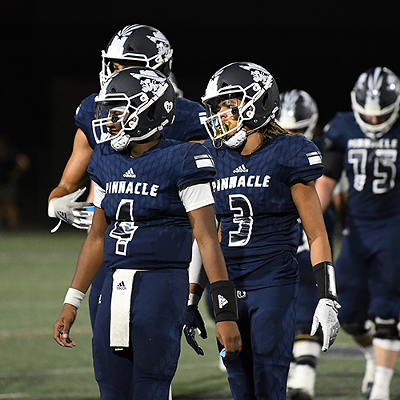For the past quarter-century or so, the University of Arizona has largely been known athletically for men's basketball and women's softball.
But Wildcats teams have also won national championships in men's and women's golf and men's and women's swimming in that period, to go along with national titles in baseball won in the 1970s and '80s.
Arizona's Athletic Department has a well-deserved, but often overlooked reputation for overall excellence. For nine straight years, through 2002, Arizona had Top 10 finishes in the prestigious Sears Directors' Cup (now known as the Learfield Sports Directors' Cup), which measures conference and national finishes in 10 men's and 10 women's sports. And the school is looking to climb back into the Top 10 this year.
While the football quarterback, the softball pitcher and the point guard on the men's basketball team are usually household names, there are many others who give their all to endeavors athletic and artistic, perchance to win glory for their teammates, their bandmates, their school and themselves.
Among them ...
Deanna Graham
What's the least-realistic sports-related movie of all time? OK, it's probably Space Jam, but only because we all know that, despite his cool demeanor, Bugs Bunny has no game.
University of Arizona gymnast Deanna Graham has her own answer to that question.
"Stick It has got to be the most unrealistic sports movie ever. It's entertaining and all, but you wouldn't believe the number of things that are wrong in that movie," she says.
Graham would certainly know. She started doing gymnastics at age 3, and "I can't remember a time when I wasn't a gymnast," she says.
A graduate of Tucson's Desert Christian High School, the 20-year-old junior is a stalwart on the Wildcats team. She was first-team All-Pac-10 in the all-around competition last season and was the only member of the team to advance to the NCAA National Championships.
In a sport where blowouts are measured in tenths of a point, Graham posts stratospherically high scores. In the all-around—which consists of scores up to a possible 10 each in the floor exercise, balance beam, uneven parallel bars and the vault—a perfect (and virtually unattainable) combined score is 40. Anything higher than 39 is big-time.
Graham topped that number for the first time against Stanford last spring, when she scored 39.025. Later in the season, against Minnesota, she scored near-perfect 9.9s on both the vault and floor exercise en route to a 39.400 overall score. After scoring a 39 against Denver, she posted marks of 39.275 at the Pac-10 Championships and 39.025 at the NCAA Regional Championships. While her best events are obviously vault and floor, she's putting in extra work to bring up her scores in the beam and bars.
She still has friends from high school, but she mostly hangs out with her teammates. "I love my coaches, and I love my teammates. It's like a family," she says.
The media guide has her listed as 5 foot 2, but that's before the laughter dies down. When asked whether she possesses gymnast-dar (a word not even Sarah Palin could make up), she laughs, "Oh, I can always spot another gymnast, and it's not always because of height. It's the way they move, the way they carry themselves. But people who aren't gymnasts ask me if I am one. Maybe my height has something to do with it, but I hope it's because I look athletic."
Max Wiepking
Get this: Max Wiepking, a walk-on member of the University of Arizona basketball team, doesn't like Hoosiers. That's like finding a Catholic priest who says, "I kinda like Paul's letter to the Colossians, but those gospel things are way too boring for me."
Otherwise, Wiepking seems rather normal. He starred at Kent Denver School in Englewood, Colo., and was headed for Ithaca College in New York when his brother's friend helped land him the gig as a walk-on in the first year of the Sean Miller era of Arizona basketball.
The life of a walk-on is parsecs away from glamorous. (This is the college back-to-school issue, so I chose to use "parsecs" instead of the more pedestrian "light years.") For every "Rudy" Ruettiger, who gets to run through that tunnel and get into the game, there are numerous walk-ons who toil in anonymity, running the upcoming opponent's plays in practice or playing defense while the first team works on its offensive sets. Wiepking got a couple of minutes of playing time in an exhibition game last year against Western New Mexico, but didn't get in any regular-season games.
At 6-foot-6, he played center in high school, but the realities of Division I basketball pretty much force him to be a small forward. Observers say that he's strong and has a good shot, and that his ball-handling is coming along.
The sophomore business major is looking forward to the coming season.
"Last year was up-and-down and exciting, but this year is going to be so much better," he says. "We have a lot more depth, and Coach Miller is a master at putting people in great positions to succeed."
At the end of the interview, I asked him about his favorite basketball movie. He said it was Glory Road, the earnest dramatization of the historic victory in the 1966 NCAA Finals by Texas Western (now UTEP), with its all-black starting lineup over the all-white Kentucky team, coached by legendary racist Adolph Rupp. (What's really amazing about that movie is that producer Jerry Bruckheimer auditioned dozens of African-American actors for the parts of the seven Texas Western ballplayers, and somehow managed to find only two who could actually play basketball.)
At least Wiepking didn't pick The Fish That Saved Pittsburgh.
When I mention Hoosiers, he says, "I don't like that movie; it's too slow." Since there is no interviewer-interviewee privilege, I feel honor-bound to report this to Coach Miller.
Wiepking seemed like a nice guy, so I decided not to ask him his favorite football movie. I was afraid he'd say Leatherheads instead of Remember the Titans.
Andrea Smith
Andrea Smith holds the key to the End of Days.
Smith is the manager for the UA men's and women's swimming and diving teams, and she takes her responsibilities seriously.
"People don't think there's much for a swim manager to do," she says. "I mean, the uniforms aren't much. But, during practice, we have to take care of paddles, fins, buoys, snorkels and goggles."
She pauses and then says, "If we ever run out of goggles, it would be the Apocalypse."
Smith comes from a swimming family—a UA swimming family. Her sister, Marshi, won the 2005 NCAA title in the 100-yard backstroke, and her brother, Jordan, just completed his Wildcats eligibility this past spring. Andrea, too, was a swimmer, but one day, she realized that it wasn't for her.
"I started swimming when I was 3 years old, and I swam competitively for 11 or 12 years. I also played soccer and basketball, but swimming at a top level takes a lot of time and dedication that can be really hard to reach and maintain."
The Reno, Nev., native was swimming for a club team when she arrived at her own personal crossroads. "I was at the intermediate level and was doing well, but they wanted to move me up, and I realized that it would take a much-higher level of dedication. It just wasn't me."
Instead, at Reno High School, she was on the student council and was editor of the school newspaper.
She never lost her appreciation for the hard work and talent that goes into making championship swimmers, so when she heard from her siblings about the position of swim-team manager, she applied for it.
"I was so happy when I got it," she recalls. Her parents were probably happy as well, seeing as the position covers her out-of-state tuition, which these days is north of $20,000.
Smith is a junior majoring in political science. She wants to either go into law or politics. "I don't want to be a politician, but I think I'd like to be in the background as a speechwriter," she explains. "It would be exciting."
Probably the best thing about being the manager is that it gives her a built-in group of friends. "You know, you hear horror stories about how managers are treated in other sports. But (Coach) Frank (Busch) makes it clear that managers are part of the team and should be given the same respect as teammates. He's really good about that, and almost all of my friends are swimmers."
So, does she ever miss competitive swimming?
She sighs. "No."
Marcos Urrea
Marcos Urrea is The Man.
Through hard work and long hours, Urrea has reached the pinnacle of his chosen endeavor at the UA: He's this year's drum major for the Pride of Arizona Marching Band.
The Santa Rita High School grad is a senior majoring in political science. He has been in the band since arriving on campus three years ago, and plays the clarinet and the saxophone. (Not at the same time, although that would be cool.) He had his eye on becoming drum major from the very beginning. "At first, I was just happy to be in the band," he says. "It's such a great band, and everybody works as hard as possible to make it the best it can be."
Indeed, the Pride of Arizona has a longstanding reputation as one of the finest collegiate marching bands in the country. (Little-known fact: Halftime entertainment for the very first Super Bowl, in 1967, was provided by the UA Marching Band. It was about this same time—43 years ago!—that this year's act, The Who, were singing, "I hope I die before I get old.")
Urrea credits the Pride's success to its members' dedication and love of music. Neither he nor anybody else in the band receives any financial aid connected with the endeavor. And, he proudly notes, more than 90 percent of the band members major in something other than music.
Virtually any UA student in good standing can be in the band, as long as he/she is able to march while playing an instrument at a high level of proficiency. "We have auditions," Urrea explains, "but just about anybody who wants to be involved can be involved in some way."
The band members put in 15 to 20 hours of practice during the football season, including a "class" from 3 to 5 p.m. on Mondays, Wednesdays and Fridays, and 8 a.m. to noon on Saturdays. For their effort, the band members receive one unit of credit.
Urrea had to go through a two-day audition to win the spot of drum major. It was a grueling competition that included marching, conducting, calling commands and the demonstration of a deep understanding of music.
He is also a member of the smaller Pep Band that performs at UA basketball games. The Pep Band members are chosen by audition from among Pride members.
His goal this year? "I want us to be the best Pride ever."
Marketa Hanzlova
Looking as though she stepped right off the beach and onto the volleyball court, Marketa Hanzlova has Southern California written all over her.
Except she's from the Czech Republic—and the northern part of the Czech Republic, at that. So much for appearances.
The 22-year-old outside hitter is a transfer from North Idaho (Community) College, otherwise known as Hell's Waiting Room. One of the first things one notices about the 6-foot-1 Hanzlova is that she speaks English better than most American professional athletes, and better than virtually all American politicians. She knew very little English when she first arrived in this country, but has picked it up—nuances and all—very quickly.
She began playing volleyball for a club team at an early age. Unlike American club teams, which at least pretend to allow kids to try other sports, European clubs strictly limit participation to one sport, and members ride that train, in one direction, as far as it will take them. For Hanzlova, it brought her to the attention of an agent who connects players with colleges in the United States.
Hanzlova showed up at North Idaho and was an instant sensation. In 2008, while leading her squad to an 11th-place finish in the country, she was named a National Junior College Athletic Association second-team All-American and was also Region 18 Player of the Year. Last year, she was named first-team All-American as she led her team to a share of the Scenic West Athletic Conference championship and the No. 1 ranking in the country.
The UA has three senior starters back from a team that reached the NCAA Tournament last year, so Hanzlova will have to scrap for playing time. "I believe I'll do well," she says.
She's also looking forward to joining in student life at the UA. "I don't know much about American football, but I'm looking forward to being part of the (Zona Zoo)."
(There's a separate entrance for UA student athletes, so they don't have to stand in line for hours in an attempt to get a spot in the Zoo section.)
The rapidly adapting Hanzlova loves Mexican food in general, and carne asada burritos in particular. She can't wait to get an iPod so she can fill it with American R&B and hip-hop. And, despite Eminem's admonition, she might even listen to some techno.
She's unsure whether she'll major in marketing or German. (The closest big city to her hometown of Liberec is Dresden, Germany.) What she is sure of is that she loves Arizona.
"It's hot here, but it's beautiful."














